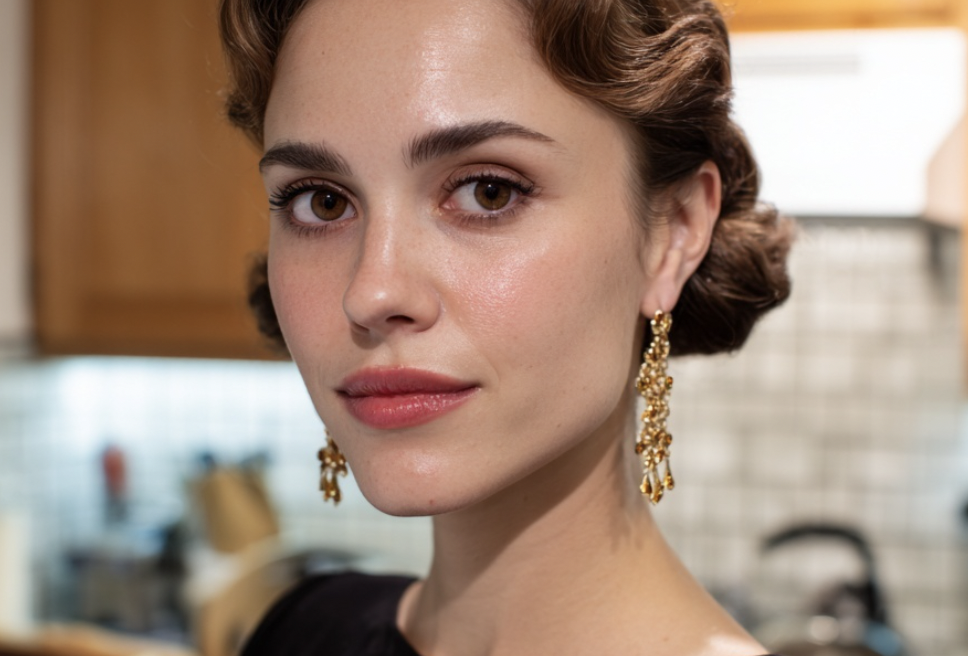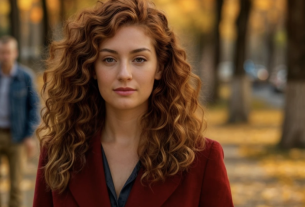“Napkins. Fix them.”
My mother-in-law’s voice, Tamara Igorevna, sliced through my nerves like a dull knife against glass. I froze, staring at the perfectly stacked linen napkins.
“What’s wrong with them?” I asked, my voice barely above a whisper.
“The corner. It’s lifted by a millimeter. Guests will think we live in a pigsty.”
I exhaled slowly, trying to still the trembling in my fingers, and adjusted the unfortunate corner.
The whole house buzzed with tension in anticipation of the dinner. My husband, Kirill, had been pacing in his office for half an hour, rehearsing his speech. This evening was crucial for his project.
Tamara Igorevna moved closer, her piercing gaze scanning my simple dark blouse and skirt.
“You’re not planning to sit at the table wearing that, are you?”
“I thought that…”
“I’ll do the thinking here,” she cut me off. “You’ll wear the dress I left on the bed. And behave properly. Viktor Petrovich is an old-fashioned man. He values modesty and good manners.”
I nodded without raising my eyes. I’d seen the dress. A beige, shapeless sack meant to turn me into a pale shadow.
Kirill emerged from his office, adjusting his tie. He gave me a quick, apologetic glance and immediately looked away.
He always did that when his mother launched one of her attacks—like his silent apology could fix anything.
“Mom, maybe don’t? Alina looks fine.”
“Fine for what? A trip to the grocery store?” Tamara snorted. “Kirill, your career is on the line. Every detail matters. Your wife is your face. And tonight, that face must be flawless.”
She turned to me, her eyes turning to icy slits. She grabbed my elbow, her fingers digging into my skin.
“Remember,” she hissed so only I could hear, “you will sit there and smile sweetly the whole evening. No opinions. No stories about your little job at that library. If someone asks—keep it short. You’re to stay quiet, beggar girl. Your job is not to ruin my son’s life. Got it?”
I yanked my arm back. Red marks remained on my skin. Inside, everything knotted into a ball of burning steel.
At that moment, the doorbell rang.
Tamara’s face instantly transformed. A radiant, welcoming smile lit up her features. She straightened her jacket and practically flew to the hallway.
“Coming! Viktor Petrovich, what a joy to see you!”
I remained in the living room, feeling like an empty shell. Kirill came over and awkwardly touched my shoulder.
“Lin, don’t be upset. She’s just nervous.”
I said nothing, only stared toward the hallway where laughter and loud voices rang out.
The guests entered. A tall, silver-haired man with a commanding but weary face led the way—Viktor Petrovich himself. His wife followed, elegant and reserved.
Tamara fussed around them, offering drinks.
“Please, come in, make yourselves at home! Kirill, take care of our guests!”
Viktor Petrovich gave the room a quick glance, nodded politely to Kirill—and then stopped. His eyes met mine.
He froze mid-sentence, staring at my face. The smile faded from his lips, replaced by utter shock, as if he had seen a ghost.
Tamara followed his gaze and looked at me too. Her triumphant smile wavered and slid downward.
The air thickened, grew sticky. Viktor’s wife, Anna, gently touched his arm, trying to bring him out of his daze.
“Darling, what’s wrong?”
But he didn’t hear her. He took a step toward me. Then another. I instinctively stepped back, hitting the wall.
His gaze was so intense, it felt like he wasn’t just looking at me—but through me, into my past.
“Forgive me… do we know each other?” he asked hoarsely.
Tamara immediately stepped between us, her smile stretched to the breaking point.
“Of course not, Viktor Petrovich! Alina is just a simple girl, from the provinces. An orphan. You couldn’t possibly know her.”
She emphasized that last word—“orphan”—throwing me a warning glance. Keep quiet.
Kirill, pale as a sheet, tried to smooth things over.
“Yes, Alina… she’s not used to events like this. Let’s sit down? I’m sure you’ll love our appetizers!”
He tried steering the guest away, but Viktor Petrovich gently brushed his hand aside, never taking his eyes off me.
“What’s your last name, young lady?” he asked, ignoring everyone else.
The question hung in the air. I felt the scorching gaze of my mother-in-law.
I opened my mouth to say the rehearsed “Petrova,” my married name, but the words stuck. Something in this man’s expression kept me from lying.
“My maiden name… is Kovaleva,” I whispered.
Viktor Petrovich swayed. His wife gasped and grabbed his arm, her face filled with alarm—and recognition?
“Vitya, please sit down. You can’t get worked up.”
Tamara was livid. Her face mottled red.
“What do you mean, Kovaleva?” she hissed. “You’re Petrova! My son’s wife! Have you lost your mind?”
She reached to drag me away, but Viktor stepped between us.
“Don’t touch her,” he said quietly—but with such steel in his voice, Tamara recoiled.
The entire dinner unraveled into farce. Kirill tried to talk about his project, but Viktor wasn’t listening.
He sat across from me, asking questions—none about the present.
“Where did you grow up, Alina?”
“In an orphanage, near Kostroma.”
“Your parents? Do you know anything about them?”
Each answer darkened his face. Tamara fidgeted, gripping her fork as if ready to bend it.
Kirill darted glances between me, his mother, and the investor, completely lost.
“Forgive me, Viktor Petrovich,” Tamara finally snapped, “but I don’t think these questions are appropriate. We’re here to discuss business—”
“Business can wait,” he cut her off, not even looking her way. He turned back to me. “Did you have… anything with you when you came to the orphanage? Something left by your parents?”
My throat tightened. I remembered. A small, worn silver locket shaped like a crescent moon. The only thread to my past I’d held onto.
I hesitated. Her command still echoed: Stay silent.
“Alina?” Viktor pressed.
I looked into his eyes—full of hope and pain. And in that moment, I made a decision.
I ignored Tamara’s furious huffing. I looked at Kirill, who shook his head in silent pleading. But I couldn’t stay silent anymore.
“Yes,” I said, voice steady. “A small silver locket. Crescent-shaped.”
Viktor’s face twisted. With trembling hands, he reached into his shirt and pulled out a chain.
Hanging from it was a small, time-worn silver sun.
“Was there… an engraving on the back?” His voice cracked. “The letter A?”
Tears welled up and spilled down my cheeks. I nodded.
“And yours,” I whispered, “was it the letter V?”
He nodded too, unable to speak. He looked at me like he had found and lost his whole world in a heartbeat.
“My daughter…”
The word landed in a silence so complete, it swallowed every sound. Tamara’s mouth hung open, her face a grotesque mask of shock. Kirill looked like he’d been punched.
Viktor stood, shaking, came over, and embraced me tightly. I clung to his jacket, inhaling a scent both unfamiliar and deeply comforting.
“I searched for you,” he whispered into my hair. “All these years. They told me you died—with your mother. The man who caused the crash… he made sure I believed it.”
His wife Anna joined us and laid a gentle hand on my shoulder. Her eyes were brimming with tears too.
“We never stopped looking, Alina. Your father never gave up.”
Tamara finally found her voice.
“What… what kind of circus is this?” she shrieked. “Father? That can’t be! She’s just… just a penniless orphan!”
Viktor turned slowly. His face was stone.
“She is my daughter. And I suggest you choose your words more carefully from now on.”
He swept his eyes across the perfect table, the trembling Kirill, and the petrified Tamara.
“I believe this dinner is over. Kirill, I don’t think we have anything more to discuss. My investments require not just promising projects, but decent partners. And people who have humiliated my daughter for years don’t qualify.”
He turned back to me, placing his hand on my shoulder with protective warmth I’d never known.
“Come, daughter. Let’s go home.”
I looked at Kirill. He stood with his head down, unable to meet my eyes or Viktor’s.
I looked at Tamara, who seemed to have aged twenty years in minutes.
And for the first time, I felt no pain. No resentment.
Only lightness—as if the crushing weight I’d carried all my life had finally fallen away.
I took my father’s hand, and without looking back, walked out of that house toward a new life.
A week passed. I was living in my father’s house, and it felt like a dream.
No one hissed at me behind my back, checked if the cups were perfectly lined up, or made me feel like a mistake. The air itself was peaceful.
My father and I would sit in the garden for hours. He told me stories about Mom—how they met, how she laughed, how she loved poetry.
I soaked up every word, piecing together an image of a woman I never knew.
“That man—our former business partner—he wanted to take everything from me,” my father once said, staring into the distance. “He staged the accident. The car was found in the river… they told me there were two bodies. He paid the right people to cover the truth. He knew losing you would break me. And he almost succeeded.”
Anna, his wife, brought us blankets and sat beside us. She was wonderfully respectful—never trying to replace my mother, just offering warmth and presence.
That evening, my phone rang. Unknown number. I answered.
“Alina? It’s Kirill.”
His voice was weak, uncertain. I stayed silent.
“Lin, I… I’m sorry. I was a coward. I always feared my mother. She didn’t just break you—she broke me too. After that night, she had a health crisis. She’s in the hospital now. The project failed. Everything fell apart.”
“I’m sorry to hear that, Kirill,” I said calmly, surprised at my own peace.
“I know I can’t undo things… but maybe you could talk to your father? Tell him I didn’t know… I love you, Lin.”
I chuckled.
“You don’t love me, Kirill. You love comfort. And I’m no longer convenient. Goodbye.”
I hung up and blocked the number. For the first time, I felt no guilt. Only relief.
The next day, my father came to my room.
“I’ve been thinking… you said you worked at a library. Did you enjoy it?”
“Yes. Very much. Books were my only friends for a long time.”
“I have an idea,” he smiled. “There’s an old bookstore in town. It’s about to shut down. I could buy it. You could run it. Do anything you want. A literary café? A book club?”
I looked at him, and tears welled up again—but these were different tears.
“Are you serious?”
“Absolutely. You’ve been silent for so long, daughter. It’s time you found your voice. And let it ring out as loudly as you deserve.”
I hugged him. And in that moment, I realized—
My story hadn’t ended that night in my mother-in-law’s house.
It had only just begun.
The story of a woman who went from silenced and scorned…
to someone who would tell her own stories.
And this time, people would listen.



